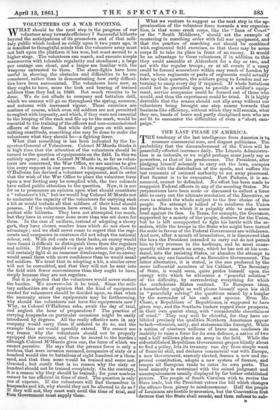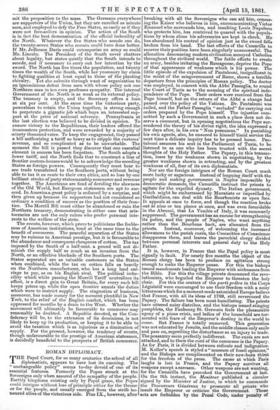THE LAST PHASE IN AMERICA.
THE tendency of the last intelligence from America is 4 reassure commercial men, and disgust politicians. The probability that the dismemberment of the Union will be peacefully effected increases daily. The Lincoln Administra- tion is as imbecile, or we might perhaps more justly say as powerless, as that of his predecessor. The President, after pledging himself solemnly to carry out the laws, occupies himself with the distribution of the spoils, and suffers the last remnants of national authority to rot away piecemeal. Fort Sumter is to be evacuated. Fort Pickens, it is an- nounced, cannot be defended. No effort has been made to reappoint Federal officers in any of the seceding States. No preparations have been made or discussed to collect a force able to carry out the ultimate resolution of the Executive, or even to submit the whole subject to the free choice of the people. No attempt is talked of to reinforce the Union party in States in which it is palpably able to make some head against its foes. In Texas, for example, the G-oveanor, supported by a moiety of the people, declares for the Union, but he is left unsupported to fight his battle with the se- ceders, while the troops in the State who might have turned the scale in favour of the Federal Government are withdrawn. And now, after a month of irresolution, it is discovered that the laws the President intended to carry out do not permit him to levy revenue in the harbours, and he must conse- quently either march an army, which he has not at his com- mand, into the resisting States, or abandon the attempt to perform any one function of an Executive Government. The latter alternative, it is stated, is the one preferred by the more influential members of his Cabinet. The Secretary of State, it would, seem, quite prides himself upon the energy with which he advocates a "peaceful solution" of the difficulty, by surrendering everything for which the confederate States contend. To European ideas, a householder might as well plume himself upon his skill in "peacefully solving" the questions raised by a burglar by the surrender of his cash and spoons. Even Mr. Chase, a Republican of Republicans, is supposed to have given way, and the Southern leaders regard their prospects, in their own quaint slang, with "considerable cheerfulness of mind." They may well be cheerful, for they have ex- hibited precisely the qualities Northern Americans appear to lack—decision, unity, and statesman-like foresight. While a nation of nineteen millions of brave men confesses its inability to raise a force for its own defence, a nation of two and a half millions places an army in the field. While the old-established Republican Government gropes blindly about to find a policy, lets its treasury run dry fiom simple want of financial skill, and declares commercial war with Europe, a new Government, scarcely elected, frames a new and im- proved constitution, adopts a new system of finance, and tempts all European trade to enter its own • orts. The local minority is restrained with the mixed ju• II ent and unscrupulousness usually displayed by far better established powers. The people of South Carolina wish to revive the Slave trade, but the President vetoes the bill which changes the offence from piracy to misdemeanour. Half the people of Louisiana are hostile to secession, but the Convention first decrees that the State shall secede, and then refuses to sob- mit the proposition to the mass. The Germans everywhere are supporters of the Union, but they are enrolled as minute men, and employed to defy the Free States, as easily as if they were not free-soilers in opinion. The action of the South is in fact the best demonstration of the official imbecility of the North. Whatever the five States who secede can do, the twenty-seven States who remain could have done better. If Mr. Jefferson Davis could extemporise an army so could Mr. Lincoln. The President of the South never chatters about legality, but states quietly that the South intends to secede, and if necessary to carry out her intention by the sword. The North has five times the population, and twenty times the wealth of the South, while her yeomanry lay claim to fighting qualities at least equal to those of the planting chivalry. Yet she submits through want of organization to an ignominious defeat from men with whose policy not one Northern man in ten even professes sympathy. The internal Government of the North is as weak as its external policy. The treasury is empty, and the Secretary offers a loan at six per cent. At the same time the victorious party, powerlesss to retain the Union together, is strong enough to perpetrate a gigantic job which buys an interested sup- port at the price of national solvency. Pennsylvania at the last election was believed to be divided in opinion. To ensure victory to the Republicans, their leaders offered the ironmasters protection, and were rewarded by a majority of ininety thousand votes. To keep the engagement, they passed a bill authorizing a tariff so heavy as to cripple the customs' revenue, and so complicated as to be unworkable. The moment the bill is passed they discover that one essential element in success has been forgotten. The South adopts a lower tariff, and the North finds that to construct a line of frontier custom-houseswould be to acknowledge the seceding States as foreign powers. Consequently they must bear to see trade transferred to the Southern ports, without being able to tax it en route to their own cities, and so lose by one brilliant stroke of party statesmanship commerce and revenue together. The Americans are fond of deriding the slowness of the Old World, but European statesmen are apt to suc- ceed. In America a great policy is enforced by a surprise, and then given up because its supporters had not considered so ordinary a condition of success as the position of their fron- tier. The Morrill Bill must either be abandoned or ruin the Northern treasury, demonstrating in either case that aris- tocracies are not the only rulers who prefer personal inte- rests to the welfare of the state.
The events, however, which prove to politicians the feeble- ness of American institutions, tend at the same time to the benefit of commerce. The peaceful separation of the States may be ruinous to American prestige, but it is favourable to the abundance and consequent cheapness of cotton. The tax imposed by the South of a half-cent. a pound will not di- minish the supply half so _much as an invasion from the North, or an effective blockade of the Southern ports. The States separated are as valuable customers as the States when combined, while the tax on cotton falls as heavily on the Northern manufacturer, who has a long land car- riage to pay, as on his English rival. The political imbe- cility which while passing the Morrill Tariff neutralizes its effect, is a direct gain to Great Britain, for every such bill keeps prices up, while the open frontier annuls the duties which were to restrict supply. The stagnation of business, moreover, has made money for the moment plentiful in New York, to the relief of the English market, which has been oppressed for months by a drain to the West. Whether the movement will ultimately be favourable to commerce may • reasonably be doubted. A Republic devoted, as the Con- federacy will be, to the extension of its dominions, is not likely to keep up its production, or keeping it to be able to avoid the taxation which is as injurious as a diminution of supply-. For the present, however, the tendency of events, though unfavourable to the prestige of American statesmen, is decidedly beneficial to the prospects of British commerce.































 Previous page
Previous page